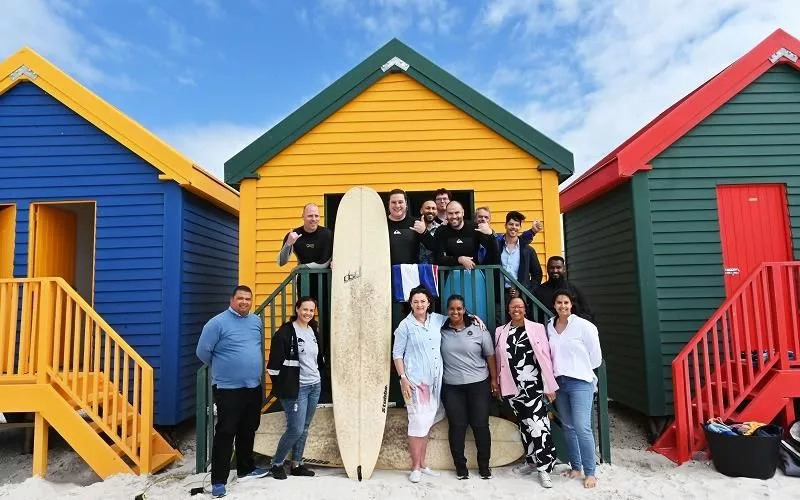South Africa is making significant progress in science, technology, and innovation, led by President Cyril Ramaphosa’s emphasis on their critical role in shaping the country’s progress. South Africa is ranked 61 out of 132 economies for innovation capabilities, largely due to its comprehensive strategy that focuses on education, research and development, and information technology access. However, the country still needs to make more significant progress in the realm of research and development, with a modest expenditure of 0.6 percent of GDP. South Africa is looking towards bolstering cooperation between governmental bodies and the industrial sector and creating sustainable job opportunities through scientific and technological activities.
Advancing South Africa: The Presidential Summit on Science, Technology, and Innovation
Discover how South Africa is leveraging science, technology, and innovation to advance the national system of innovation and stimulate economic growth and societal progress. President Cyril Ramaphosa emphasized the critical role of these elements in shaping the progress of countries in the context of the Fourth Industrial Revolution and the evolving global work landscape. With a commendable ranking at 61 out of 132 economies for innovation capabilities, South Africa’s comprehensive strategy intertwines a focus on education, promotion of research and development, and the provision of information technology access.
The CSIR Convention Centre in Tshwane recently set the stage for a momentous occasion. The inaugural Presidential Science, Technology, and Innovation Summit offered an avenue for collaboration among academia, government bodies, industrial sectors, and civil society to stimulate South Africa’s National System of Innovation. Honoured by the attendance of President Cyril Ramaphosa, the gathering underscored South Africa’s potential to spearhead a future shaped by economic growth and societal progress, bolstered by scientific, technological, and innovation-driven initiatives.
President Ramaphosa emphasized the role of scientific, technological and innovative prowess in shaping the progress of countries in the context of the Fourth Industrial Revolution and the evolving global work landscape. This perspective mirrors a worldwide understanding that recognizes these elements as fundamental to socio-economic well-being and development.
The Global Innovation Index, released by the World Intellectual Property Organisation in 2022, affirms South Africa’s considerable strengths in this area. The country’s ranking at 61 out of 132 economies for innovation capabilities is a testament to its potential, particularly in terms of market sophistication, knowledge and technology outputs, and creative outputs.
South Africa’s Path to Progress: A Multifaceted Approach
This commendable standing has been achieved through a comprehensive strategy that intertwines a focus on education, promotion of research and development, and the provision of information technology access. A significant emphasis on higher education has led to the number of public university graduates increasing fourfold from 60,000 in 1994 to approximately 230,000 in 2018. Moreover, the increasing proportion of graduates in the fields of science, engineering and technology underscores the country’s dedication to nurturing talent in these crucial areas.
Yet, the journey towards a thriving knowledge economy necessitates more substantial progress, especially in the realm of research and development (R&D). Despite a modest R&D expenditure of 0.6 percent of GDP in 2021, the country is far from reaching its target of 1.5 percent. In contrast, the United States and South Korea allocated 2.6 percent and 5 percent of their GDP, respectively, to R&D in 2022.
Reversing this trend is of paramount importance. To this end, South Africa is looking towards bolstering cooperation between governmental bodies and the industrial sector. The Innovation Fund initiative is a prime example of this, where the state and corporate entities have collaborated to support technology-based SMMEs in product commercialization.
Unleashing South Africa’s Innovation Potential
South Africa’s capacity for innovation is noticeable in various sectors. A significant upturn in venture capital investments indicates a positive trajectory for the nation’s innovation potential. Progress in sectors such as mobility, mining, clean energy, and more, as displayed at an exhibition attended by President Ramaphosa, further underscore this potential.
Revitalizing the mining industry is also on the agenda, with significant research conducted by the Mandela Mining Precinct and the South African Mining Extraction Research, Development and Innovation initiative. Renewable energy and green hydrogen are other areas where promising R&D activities are underway.
In the medical field, South Africa is making considerable advancements. The COVID-19 pandemic, despite its challenges, has propelled the nation’s efforts towards health security and vaccine production. The World Health Organisation’s mRNA vaccine technology hub in Cape Town and Afrigen Biologics’ development of a new tuberculosis vaccine using mRNA technology exemplify the country’s burgeoning capabilities in this area.
Fostering Employment through Innovation
The nexus between innovation and employment is garnering significant attention. The Jobs Fund is investing in scientific and technological activities that lead to sustainable job creation.
Applications of scientific innovation were demonstrated during the floods in KwaZulu-Natal and other regions last year, where satellite imagery was instrumental in rescue and recovery operations. As climate change becomes an inescapable reality, such scientific partnerships will gain increasing significance.
To build a solid scientific and technological base for South Africa, strategic investments in education and skills development are crucial. Towards this, the government has pledged commitment to the Presidential PhD Initiative, which aims to introduce young minds to cutting-edge research with an initial investment of R1 billion. This initiative seeks to develop critical skills in emerging fields such as artificial intelligence research, advanced biotechnology, fuel cell development, and next-generation mining. The ambition is to increase the Initiative fund to R5 billion by 2030, calling on the private sector and international partners for support.
Science, technology, and innovation extend beyond economic growth and prosperity. They are integral to preserving the natural environment and enriching all human activities. As South Africa embarks on this venture, it stands ready to learn from global experiences and chart its unique course towards a future powered by science and innovation.
1. What is the Presidential Summit on Science, Technology, and Innovation in South Africa?
The Presidential Summit on Science, Technology, and Innovation is a gathering of academia, government bodies, industrial sectors, and civil society to stimulate South Africa’s National System of Innovation. It is led by President Cyril Ramaphosa, who emphasizes the critical role of these elements in shaping the progress of countries in the context of the Fourth Industrial Revolution.
2. How is South Africa ranked for innovation capabilities?
South Africa is ranked 61 out of 132 economies for innovation capabilities, largely due to its comprehensive strategy that focuses on education, research and development, and information technology access.
3. What is South Africa’s focus towards advancing science, technology, and innovation?
South Africa’s comprehensive strategy intertwines a focus on education, promotion of research and development, and the provision of information technology access. A significant emphasis on higher education has led to the number of public university graduates increasing fourfold from 60,000 in 1994 to approximately 230,000 in 2018.
4. What is South Africa’s expenditure on research and development?
Despite a modest research and development (R&D) expenditure of 0.6 percent of GDP in 2021, the country is far from reaching its target of 1.5 percent. In contrast, the United States and South Korea allocated 2.6 percent and 5 percent of their GDP, respectively, to R&D in 2022.
5. How is South Africa fostering employment through innovation?
The Jobs Fund is investing in scientific and technological activities that lead to sustainable job creation. Applications of scientific innovation were demonstrated during the floods in KwaZulu-Natal and other regions last year, where satellite imagery was instrumental in rescue and recovery operations.
6. What is the Presidential PhD Initiative in South Africa?
The Presidential PhD Initiative is an initiative that aims to introduce young minds to cutting-edge research with an initial investment of R1 billion. This initiative seeks to develop critical skills in emerging fields such as artificial intelligence research, advanced biotechnology, fuel cell development, and next-generation mining. The ambition is to increase the Initiative fund to R5 billion by 2030, calling on the private sector and international partners for support.












